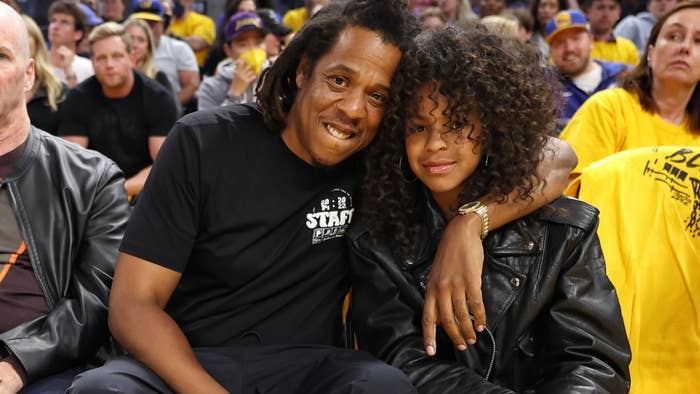
Blue Ivy isn't always impressed by her dad.
In a new interview with Gayle King, Jay-Z revealed exactly what his daughter thinks of him.
“Blue, she be frontin’ on me a little bit, but she—I catch her,” he said. “I catch her in the corner, you know? Now she asks me if this cool, her sneakers or whatever she’s wearing.”
When asked if the 11-year-old seeks his advice, he said, “Yeah, she’s come back. But there was a time when she was like, ‘Dad!’ I was like, ‘I’m cool, I don’t know what you saying.’ At your house, your parents is cool.
Elsewhere in the exclusive interview, King and Jay took a private tour of the mogul’s "Book of Hov"exhibit at the Brooklyn Public Library, where they discussed how the exhibit came to be, his trademark hand symbol—”throwing up the roc”—his debut album, had, and more.
They also discussed his writing process when it comes to music.
“I’m fascinated by your process of normally not writing things down,” King said. “How are you able to have that in your head - how do you keep track of all that?”
“I’ve lost a lot of songs that way. I’ve lost a lot of material,” Hov explained. “I was every night writing in that notebook, that notebook that my mom gave me. It had no lines on it. When I started getting outside, moving further away from my mother’s house, start running the streets, these ideas, they would come and then I would run into a store ‘cause I’m on the corner, and I would write it on paperback and I would put it in my pocket until I got home and I’d transfer it to a book. But then ideas come, more paper … I’m getting further and further away. I had to memorize ideas until I got back."
At the end of part one of King’s interview with Jay, she asked him which part of his career had become the most significant to him.
“I think what matters most is today, is being a beacon and helping out my culture, people of color,” he said. “I think I pull the most satisfaction from that. Like making music early was like my first love. I could sit there for hours—it consumed me. … That’s why my pace was so fast; I had so much material. And I think now, the idea of taking that platform and reproducing it for others or doing something like reform, I think I derive the most joy from that.”


